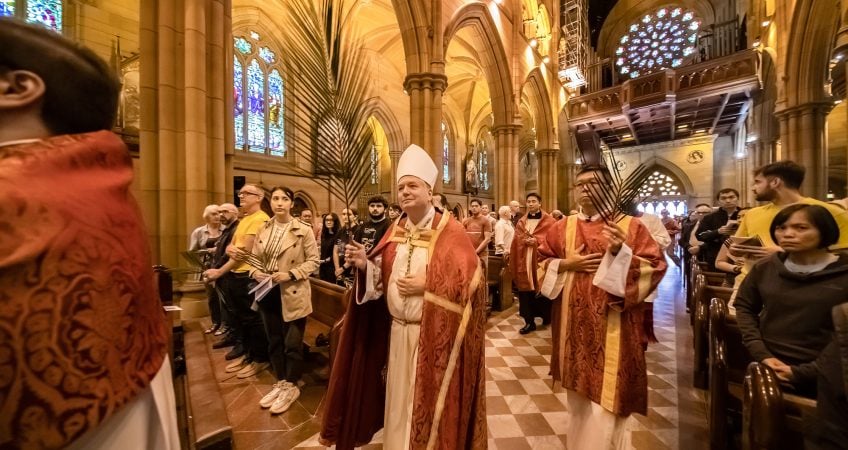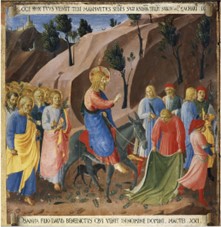Homily for the Mass of Palm Sunday of the Passion of the Lord, Year A

St Mary’s Cathedral, Sydney 2 April 2023
‘The Wisdom of Crowds’ is the idea that by pooling information, experience and judgment, groups of people make better decisions than individuals alone. Writers in social psychology, market economics, evolutionary biology and other fields argue that, as social animals, we achieve much more by collaborating with others. It’s not a new idea: in the Politics, Aristotle used the analogies of a “potluck”, where each person brings a plate to a feast, or music appreciation, where each one has their own interpretation, as examples of mutual enrichment by the many.[1]Advocates of democracy argue it’s the best form of government, not so much because it is of the people and for the people, as because it is by the people: individuals bring diverse perspectives to the ballot box, government and administration, sharing their wisdom, supplying for each other’s deficits, and attending to the common good, not just their own interests.[2]
Being part of a crowd can be exhilarating. Though we value personal excellence, there is something intoxicating about team sports both for players and spectators. In other contexts, too, we feel a greater sense of purpose and security when we are with others. We are emboldened if we have the backing of many. Crowds can also give powerful testimony: consider World Youth Day—over a million young people will celebrate it in Lisbon this year—or the thousands who take part in our annual Walk with Christ eucharistic procession.
ooo
From at least the fourth century AD, crowds gathered on the Sunday before Easter for a procession from the site of Christ’s entry into Jerusalem to the Basilica of the Holy Sepulchre, waving palms and singing the text from Matthew with which our choir began today’s celebration (Mt 21:9).[3] By the Middle Ages, not just in Jerusalem but in Rome and throughout Europe, palms, spring blossoms or tree branches were blessed in a place designated as the Mount of Olives in each town, and carried in procession.[4] In England the crowd would split into two processions: one representing the crowd, awaiting the triumphal entry into Jerusalem, waving their branches and banners; the other, representing Christ and the disciples, carrying relics of the saints and ‘the Great Relic’, the Blessed Sacrament under a canopy, a precursor of the Corpus Christi procession.
The two processions then made their way to the cathedral or parish church for Mass, singing St Theodulph’s hymn, All Glory, Praise and Honour, and shouting Hosannas. Choir boys took places way up in the triforium as if they were angels, and the three cantors of the Passion balanced atop the rood-screen, high above the nave.[5]
So, ‘the wisdom of crowds’ has its place, not just in politics, economics or sports, but in Catholic faith and ritual. In a ‘synodal’ Church, all the baptised, not just the clergy, walk together, as if in a grand palm procession, singing God’s praises, professing their faith, listening to each other’s voice, and contributing in various ways to the life of the Church.
ooo
But crowds are not always reliable. The ‘herd mentality’ means people switch off their critical faculties and independent judgment, and just go with the mob. Pack behaviour can be irrational, even violent. Just as virtue and wisdom can be aggregated, so too can hatred and vice.
Christ was a crowd pleaser. Thousands gathered to hear Him preach in Galilee, witness His signs, and enjoy the fruits of both, as when He multiplied loaves and fishes. But the crowd repeatedly turned against Him, for His teaching on the Eucharist (Jn 6:60-66) and His claims to divine authority (Lk 4:29; Jn 8:57-58).

Today Jesus enters triumphally into Jerusalem to complete His saving mission, to a fanfare of “Blessed is He who comes in the name of the Lord. Glory to God in the highest and peace to His people on earth. Hosanna to the Son of David” (Mt 21:1-11 etc.). The collective wisdom was that this was the long promised Messiah.
Yet only days later, the crowd’s collective discernment points in a very different direction. “Crucify him, crucify him!” they now shout (Mt 27:22). “We have no king but Caesar.” We need no Messiah. We prefer the gangster Barabbas. In place of palms, we’ve got sticks to beat Him with and a cross to nail Him.
The crowd see-saws, but Christ is the fulcrum, the stable point. Sometimes humanity gets it right, commonsense reigns, the influencers promote the good. At other times, the more the murkier. The majority oppress the minority, commonsense proves uncommon, the good is trolled and the true cancelled. Much of Christian life is countercultural. We don’t get our faith from a poll or focus group. It takes courage to stand up against the crowd. for what we believe. Palm Sunday tests of our mettle.
But we need the crowd. Christianity is not the religion of an elite, a cult of the perfect: it is for all humanity, sinners hopefully on the way to being saints. We need each other for teaching, worship and care. And we dream of a future where every people and nation is united in the new Jerusalem, delighting rather than fighting both over what they have in common and the differences. In the meantime, we have our friends and families, our civil communities, above all our Church, intimations of the communion to come. We bring the palms of our temperaments and the banners of our actions, to enrich each other in the great procession of life, singing Hosanna in one great polyphony to the King of glory.
[1] Aristotle, Politics, Book 3 1281a40–b10, translated and edited by Jonathan Barnes (Cambridge: Cambridge University Press, 1996).
[2] David Blagden, Do Democracies Possess the Wisdom of Crowds? Decision Group Size, Regime Type, and Strategic Effectiveness, International Studies Quarterly 63(4) (2019): 1192-1195.
[3] Philip Goddard, Festa Paschalia: A History of the Holy Week Liturgy of the Roman Rite (Gracewing, 2011), 29-30.
[4] Goddard, Festa Paschalia, 66-98.
[5] Christopher Howse, “Christ’s entry via a rainy English churchyard,” The Telegraph 25 March 2023; Goddard, ibid.

